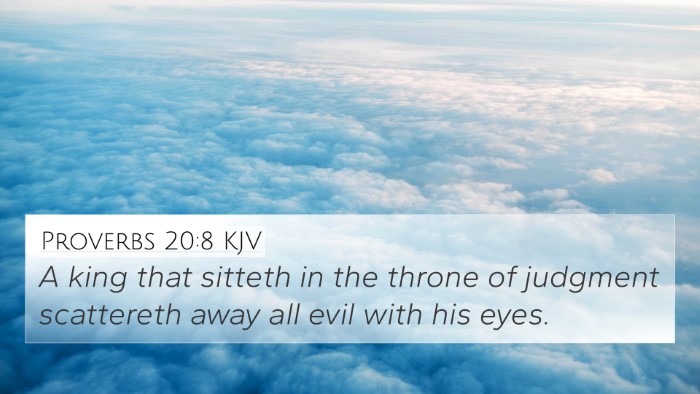Understanding Proverbs 29:12
Proverbs 29:12 states: "If a ruler listens to lies, all his officials become wicked." This verse highlights the critical relationship between leadership and integrity. Through the insights derived from public domain commentaries by Matthew Henry, Albert Barnes, and Adam Clarke, we can explore this verse's meanings and implications in greater depth.
Insights from Commentaries
Matthew Henry emphasizes the importance of truthfulness in leadership. He asserts that a ruler who is swayed by falsehoods sets a precedent that trickles down through his administration, leading to corruption among his officials. The nature of good governance is fundamentally relied upon the discernment of truth, and this verse reflects the profound impact that a ruler's integrity has on social order.
Albert Barnes extends this idea, noting that when a ruler's decisions are influenced by deceit, it cultivates a toxic environment. Officials who witness or participate in such dishonesty are more likely to engage in wicked actions themselves. This observation reveals a pattern where the moral standing of leaders directly influences those under their authority, suggesting that integrity is necessary for healthy governance.
Adam Clarke argues that the principle taught in this proverb is not only applicable to rulers but can also be extended to any leadership position. Leaders who are not committed to truth may unknowingly foster an atmosphere of corruption and immorality. This underscores the weighty responsibility leaders carry, as their commitment to honesty shapes the ethical landscape of their community.
Thematic Connections
Proverbs 29:12 has notable thematic connections to a variety of other biblical principles regarding leadership, truth, and morality. Here are some related Bible verses that enhance our understanding of this theme:
- Proverbs 16:10: "The lips of a king speak as an oracle, and his mouth should not betray justice." - This verse exemplifies the duty of a king to speak truthfully.
- Proverbs 20:28: "Love and faithfulness keep a king safe; through love his throne is made secure." - Reinforcing the idea that integrity and faithfulness are foundational to stable leadership.
- 1 Timothy 3:2: "Now the overseer is to be above reproach, faithful to his wife, temperate, self-controlled, respectable, hospitable, able to teach." - Emphasizing moral standards for leaders in the church.
- Proverbs 28:2: "When a land transgresses, it has many rulers, but with a man of understanding and knowledge, its stability will long continue." - Relating stability in leadership to the wisdom and understanding of the ruler.
- Exodus 18:21: "But select capable men from all the people—men who fear God, trustworthy men who hate dishonest gain—and appoint them as officials over thousands, hundreds, fifties, and tens." - God’s instruction for selecting leaders based on their integrity.
- Romans 13:4: "For the one in authority is God’s servant for your good. But if you do wrong, be afraid, for rulers do not bear the sword for no reason." - Discussing the role of rulers as servants of God in upholding justice.
- Proverbs 12:5: "The plans of the righteous are just, but the advice of the wicked is deceitful." - Contrasting the intentions of the righteous and wicked, emphasizing the importance of good counsel.
Practical Applications
The implications of Proverbs 29:12 extend beyond the realm of governmental leadership to personal and corporate leadership contexts. Some practical applications include:
- Integrity in Leadership: Leaders should commit to honesty and transparency in their dealings to cultivate trust and fidelity among those they lead.
- Building a Culture of Truth: Organizations should encourage an environment where truth is valued and dishonesty is unequivocally rejected.
- Self-Reflection for Leaders: Leaders must regularly examine their motives and the sources from which they gather information, ensuring they are not influenced by deceit.
Cross-Referencing Biblical Texts
Understanding Proverbs 29:12 through a lens of cross-referencing expands its interpretation and applicability. Tools for Bible cross-referencing help uncover these connections:
- By utilizing a Bible concordance, you can identify other verses that emphasize the importance of truth in leadership.
- The Bible cross-reference guide equips you to navigate similar themes throughout Scripture, enhancing your Bible study.
Conclusion
Proverbs 29:12 serves as a critical reminder of the moral responsibility entrusted to leaders. Through the insights derived from various commentaries, thematic connections to other scriptures, and practical applications, we grasp the immense weight of truth and integrity in leadership. As we explore these connections, we find strategies for building strong, ethical leadership in our communities.












